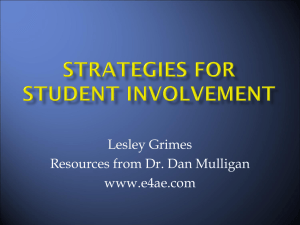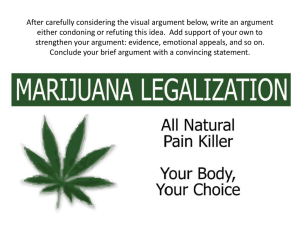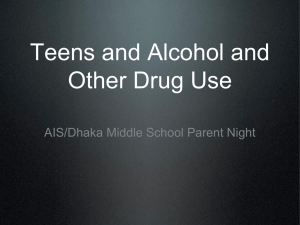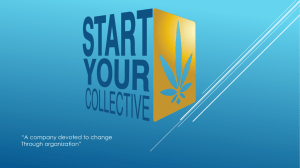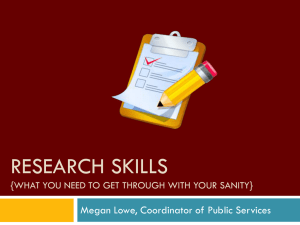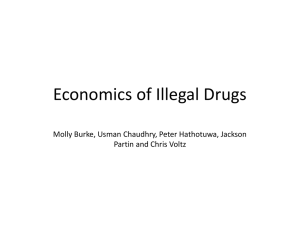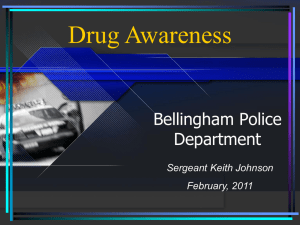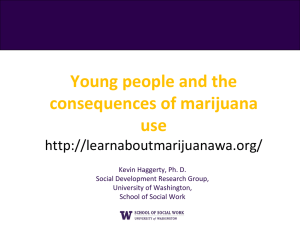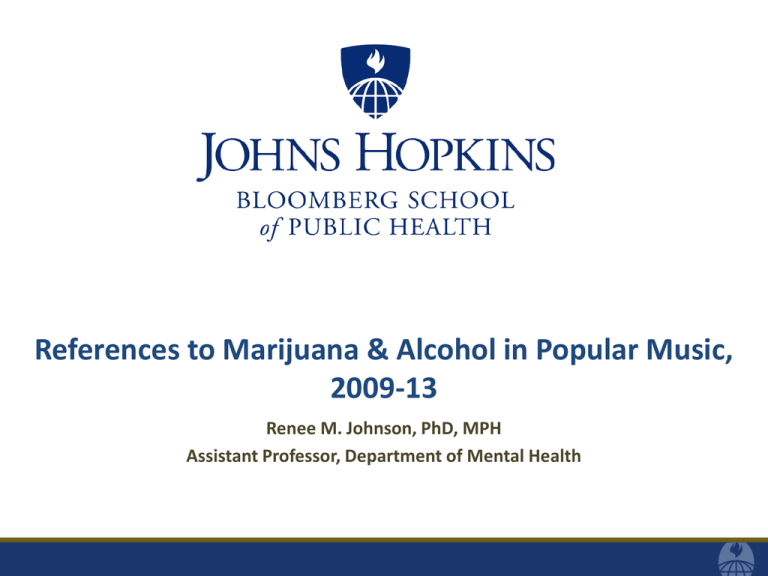
References to Marijuana & Alcohol in Popular Music,
2009-13
Renee M. Johnson, PhD, MPH
Assistant Professor, Department of Mental Health
Acknowledgements & Funding
• Michael B. Siegel, MD, MPH; Professor, Dept. of
Community Health Sciences, Boston University School
of Public Health
• BUSPH Students: Amanda J. Ayers; Courtney
Kaczmarsky; Adina Koch; Mark Lohsen; Taylor D.
Parnham; Kathryn Power
• Funding: K01DA031739 (RM Johnson)
Past 30-Day Use of Alcohol & Marijuana, 9th-12th Graders, US
Source: National YRBS, 1991-2013
60
Alcohol
Marijuana
50
51
40
48
52
51
50
47
45
43
45
39
30
23
24
22
18
20
20
2007
10
25
27
2005
20
26
35
21
15
2013
2011
2003
2001
1999
1997
1995
1993
1991
0
Media & Adolescent Substance Use
Music, television, Internet – “Super Peers”
Listen to music ~2.5 hours/day
Media references to substance use
Inform youths’ attitudes and expectancies
Appeal to emotion, affect, identity, self-image
Normalizes use in specific contexts
Smoking in bed after sex
Binge drinking at a party in college
“Media dependent”
Background
720 Billboard songs, 2009-2011 (Siegel et al., 2013; PMID:23971875 )
Drinking portrayed as fun and free of consequences; references were
uniformly positive
23% of songs had an alcohol reference
Urban songs 2.5 times more likely to contain an alcohol reference
compared to Pop, Country, & Rock
279 Billboard songs, 2005 (Primack, et al., 2008; PMID: 18250243)
24% of songs had an alcohol reference, 14% had a reference to
marijuana
Substances associated with partying and fun
Rap, Hip-Hop, and R&B had the largest number of references to alcohol
and marijuana
Research Aims
Quantify prevalence of references to marijuana and
alcohol in popular Urban songs, 2009-2013
Urban: Hip-Hop/R&B, Rap Charts
Identify the words used to reference marijuana
Qualitatively assess references to marijuana
Contributions: more recent, 5 years of data, focus on
marijuana
Methods
Assembled list of songs on the Billboard Hip-Hop/R&B and Rap
charts, 2009-2013
Obtained lyrics from www.azlyrics.com and www.rapgenius.com
Accuracy of lyrics
Bleeps/ clean edits
Created a data abstraction protocol, all songs screened for
references
Songs with references reviewed for context, thematic analysis
References to Marijuana in Songs Ranked by
Billboard (2009-2011), by Genre (n=719)
84% (57/64) of references to marijuana
were in Urban songs
Total
8.9%
Urban
22.4%
Pop
2.7%
Rock
1.5%
Country
0.6%
0%
5%
10%
15%
20%
25%
30%
35%
40%
References to Marijuana and Alcohol in Songs on
Billboard’s Hip-Hop/R&B and Rap Charts, 2009-2013
Any Marijuana
27.9%
(126)
Any Alcohol
38.4%
(173)
Marijuana Only
11.1%
(50)
Alcohol Only
21.5%
(97)
Marijuana & Alcohol
16.9%
(76)
References to Substances in Songs on Billboard’s HipHop/R&B and Rap Charts, 2009-2013, by Year
Marijuana
Alcohol
60%
51%
50%
40%
45%
34%
36%
34%
38%
30%
20%
31%
32%
2011
2012
23%
18%
10%
0%
2009
2010
2013
11
Thematic Analysis
Boasting about Wealth
“I’m burning purple flowers/ It’s burning my chest/ I bury
the most cash and burning the rest/ Walking on the cloud,
suspended in thin air/ Do ones beneath me recognize the
red bottoms I wear?” {I’m On One, by Drake feat. Rick Ross}
Partying & Good Times
“In the club high on purp with some shades on/Tatted up,
mini skirt with my J's on” {23, by Mike Will Made It, feat.
Miley Cyrus, Wiz Khalifa & Juicy J}
“This club so packed, these hoes so drunk/I got a bottle, got
a model, got a molly, got a blunt” {Ball, by T.I. feat. Lil
Wayne}
Thematic Analysis
Negative Physical Effects
“Smoking, choking, always rollin' something” {Till I Die, by
Chris Brown, feat. Big Sean & Wiz Khalifa}
“Red eyes, no Visine, I'm locked out on the bean” {Same
Damn Time, by Future}
Minimal references to legal, health, or social consequences
of substance use
Discussion
Conclusions
References to marijuana (28%), alcohol (38%), or both (17%)
were common
Listeners exposed to portrayals of marijuana as part of a fun
and rich lifestyle, something to strive towards
Future Research: How do we know what is too much? And
for whom? How does it impact Black youth?
Practice Implications: Increase opportunities for youth to
critically reflect on messages they receive and clarify
personal values

